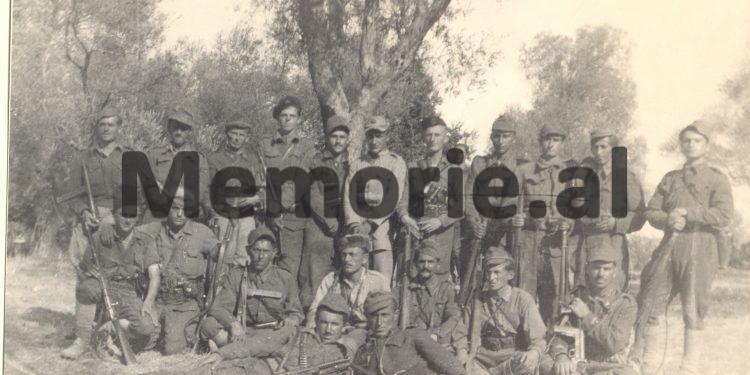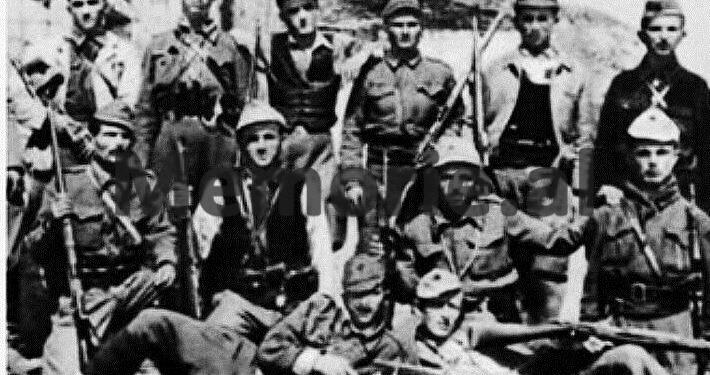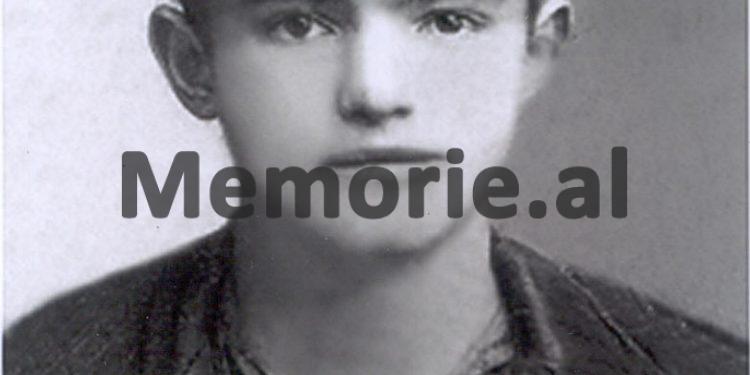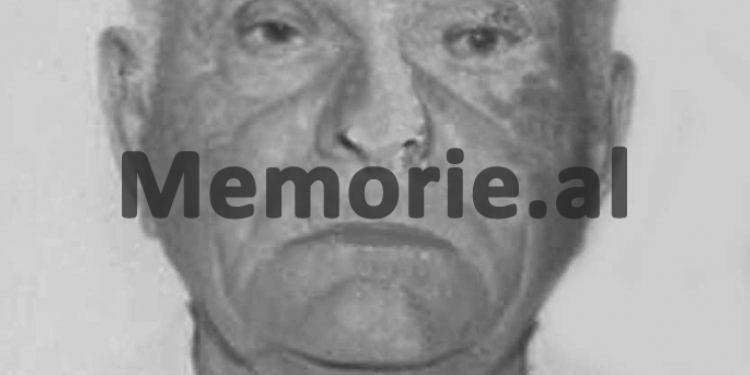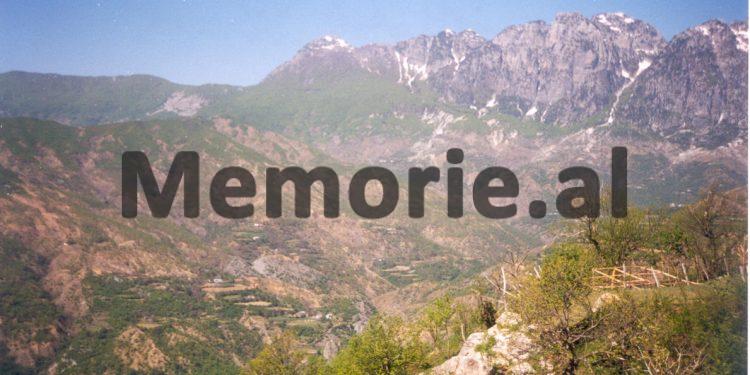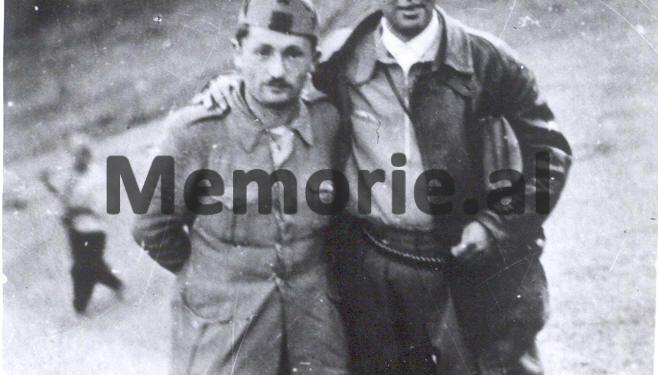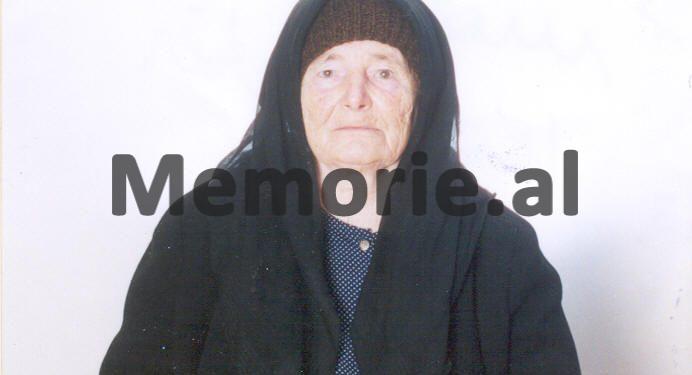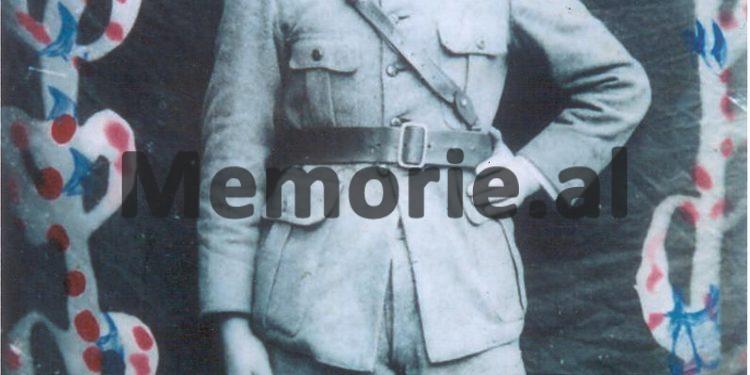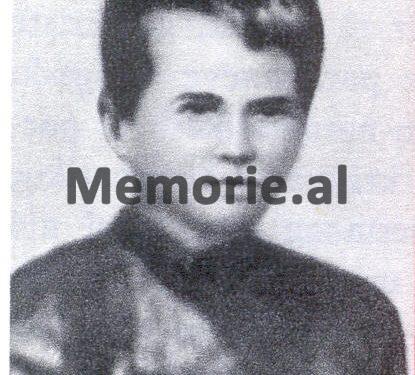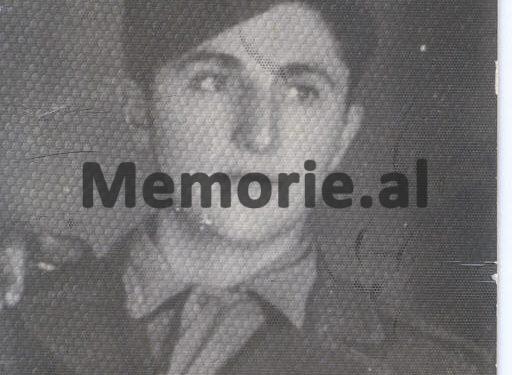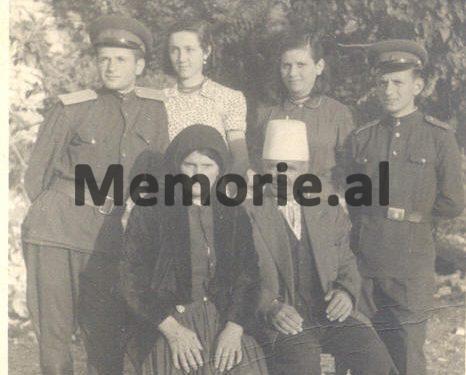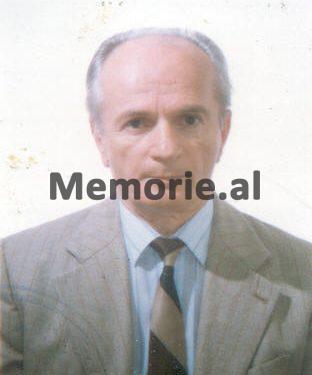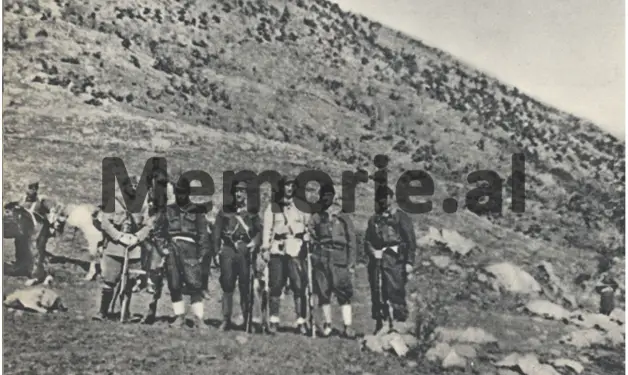Dashnor Kaloçi
Memorie.al publishes the unknown story that took place on November 28, 1944 in the village of Xhan in the deep province of Dukagjini, where a partisan unit of the VI Assault Brigade commanded by Commander Jaho Gjoliku and Commissar Haki Toska, executed a group mountaineers from the village of Bruçaj, who, traveling at night to their homes after shopping in the city of Shkodra, encountered a partisan ambush of that brigade commanded by the 15-year-old pioneer, Çelo Sinani, (“People’s Hero”) who was killed during an exchange of fire between them.
The rare testimony of Prek Sokol, originally from Dukagjini and living in the village of Rranxa in Bushati, which tells the whole story of that painful event, where in revenge for the partisan pioneer who was mistakenly killed by those migrant highlanders in the ambush they had set up the unit of the ‘Cleansing Battalion’ by order of the command of that brigade, a young partisan, ‘sister’ of Çelo Sinani, executed ten innocent mountaineers: Tom Martini, Pëllumb Sokoli, Kol Vata, Pal Pëllumbi, Nikoll Mirashi, Mëhill Vocrri, Pal Vata, Shytan Deda, Prenush Zefi and Lazër Vuksani.
Rare testimonies of some of the families of the victims, related to the tragic event, where after the execution, the partisan unit of the VI Assault Brigade, naked stripped the ten killed mountaineers, taking the clothes they needed for their comrades partisans and disfigured the corpses by hitting them with rifle bayonets!
Testimony of Lieutenant Colonel Arif Bizhga, former company commissioner in the VI Assault Brigade and participant in that event, (former senior military with the rank of lieutenant colonel in the Ministry of Defense and Interior) and Reis Sinan, (brother of Çelo Sinan, who holds the high title “People’s Hero”), former military, graduated in Electronic Engineering in the former Soviet Union.
“As soon as they arrived somewhere in a stream, Çelo Sinan’s ‘sister’ pulled out a revolver and shot Nikol Mirashi two or three times in the head, leaving him dead on the spot. When the group of partisans of the Clearance Battalion of the VI Brigade, Attackers together with the eight tied highlanders arrived in Qafë-Thanë where the brigade headquarters was located, according to the promise they had given to the ‘sister’ of Çelo Sinani, eight the men lined her up in front of her. At that moment, she pulled the pistol from her belt and started firing at the mountaineers, hitting eight of them with two bullets to the head. When she was about to shoot at the last one, 17-year-old Mëhill Vocrri, some partisans begged her to forgive him, but she continued to shoot at him, saying: ‘Let him be the same age as my Çelo’.
After leaving the nine mountaineers dead in the ninth place (along with Nikoll Mirashi who killed him along the way), Çelo Sinan’s ‘sister’ ordered the other partisans to strip them quickly and take their clothes. the bodies of those killed, as they were needed by the partisans of the brigade, who were marching towards Montenegro”. This is how Prek Sokoli recalled that distant event that took place on November 28, 1944, the last day of the War for the partisan forces of Enver Hoxha who were marching in the province of Dukagjini, in the direction of Montenegro, where a partisan young woman, executed seven innocent men, in revenge for the murder of Çelo Sinan, the partisan pioneer, whom she considered a brother. How did that event happen, who were the ten highlanders who were executed by the hand of the sister of the martyr Çelo Sinani and why did she commit that macabre murder that has not yet been forgotten in that remote area of Northern Albania?!
Regarding that event, in addition to the testimony of Prek Sokoli and three other families where their members were in the tenth group of highlanders shot, in this article we are bringing the testimony of Arif Bizha, former company commissioner in the VI Brigade -Attacker and participant in that event, who until 1981, served as a senior soldier with the rank of lieutenant colonel in the Ministry of Defense and the Ministry of Internal Affairs, reaching the position of Deputy Chief of Staff of that ministry . Likewise, in addition to the interview with Mr. Arif Bizhga, we are also giving that of Reis Sinan (Çelo Sinan’s brother, “People’s Hero”), former military, graduated in Electronic Engineering in the former Soviet Union.
data exclusively for Memorie.al
follows from the previous number
Testimony of three of the victims’ families
For that tragic event that happened on the distant November 28, 1944, Prek Sokoli, is not the only witness who sheds light on what happened there. That story is kept fresh in the memory of many highlanders in that area and especially in the families of the victims, where one of them, Dedë Marashi, said: “I remember as now when the news came to our village about the murder of my cousin, Tom Martin, which they brought upon a vig. As soon as his body arrived in front of the house, as usual, Thomas’ father, Martin John, came out first. “telling him, ‘Why did you bring me like this?’
Testimony of Drane Vata, about the shot brother
Another witness of that event is Drane Vata, the sister of Kol Vata, who was shot by the partisan of the sixth brigade, in revenge for the murder of the partisan pioneer, Çelo Sinani, who testified: “The news of the murder of the tenth men, came to us at the time I was married in the village of Gjuraj. From there to the village of Xhan, it takes about two hours and on the way there I was trying to find out the truth about who was killed. Because for my brother Kola, they did not tell me that he was killed, because I had an only brother, and they only told me about the murder of our cousins and others. But I soon found out about the murder of my brother, Kol Vata, by a villager who shouted: ‘Be careful not to tell her about the man they killed’. I learned from him that it was about me and my brother Kola, who had received two bullets in the eyebrow and two in the eye, which had come out of his head. Our house where I was born had three killed and together with the probation (blood brother of the finger), there became a total of four who were crying together. “Since that night and for the rest of my life, I was left without a brother, and also from that day until I am at this broken age, I have not worn anything on my body, except the black color”, Drane recalled Vata regarding the murder of her brother.
Testimony of Mëhill Vocrri’s sister
Also, Lezja, the sister of Mëhill Vocërri, one of the ten victims who were shot there, in connection with that painful story, testified: “At the time of the incident, I was married in the village of Pog in the Municipality of Pultit. On the night of November 28, two villagers came to our kojshi and searched for my husband, Kol Zefi. Since the house of our cousin was not further than 30 m. out of curiosity, I secretly approached and overheard the whole conversation the two villagers had with my husband, to whom they said, among other things: ‘The partisans wounded Xhan, Leza’s brother, and sent him to Shosh’. In those moments when I heard those words about my only brother, a great horror seized my body. My husband and two villagers did not tell me the truth, and I immediately set off for Shosh, which lasted about four hours during the day and even more at night.
All the way I wondered why my injured brother had been brought to his hometown of Shosh, at a time when he could very well have been sent to Shkodra, which was just a short distance from Xhani and had a hospital there?! With this hopeless hope, I reached Shosh, where I soon learned of the grief of eternal mourning that plagued us. From that day, November 29, 1944, until today, we, the two sisters of Mëhilli, were left with black clothes and with pain in our souls “, recalled Leze Vocrri, the sister of Mëhilli, 17 years old, who before to shoot him, the partisan of the VI Assault Brigade, said to him: “Leave this, because you are my age with my Chelo”.
The reaction of the villagers to the partisans
The massacre carried out by the partisan forces of the VI Brigade (commanded by Jaho Gjoliku and the commissar, Haki Toska), on those ten innocent men, did not pass easily by the highlanders of those parts, who reacted immediately. In this regard, the 80-year-old from Shkodra, Zef Zeka, who has long been involved in research on communist terror and genocide in those northern parts of the country, testifies, among other things: “The murder of ten innocent men, infuriated immeasurably the highlanders of those villages, who immediately rose up with guns in their hands and swore revenge. So, a few days later, on December 5, 1944, a large group of villagers from Xhani and Kiri started firing against the ‘cleansing forces’ of the VI Partisan Brigade. One partisan was killed in that gun battle, while four people were killed by villagers, three by John Paul’s house and a probationer. “After that, as a sign of revenge, the partisan ‘cleansing forces’ burned seven houses in those villages and left for Montenegro”, says Zef Zeka, regarding the continuation of the conflict between the partisans of the VI Brigade and the villagers dukagjinas, a conflict which in other forms, perhaps even wilder, continued for almost half a century by the communist regime of Enver Hoxha.
The official version of the murder of the “People’s Hero”, Çelo Sinani!
Regarding the assassination of the partisan pioneer Çelo Sinani, the official historiography of the communist regime of Enver Hoxha, would write giving another version regarding that event, which Memorie.al is publishing in full:
“From that day, the pioneer Çelo Sinani became a partisan. In the Kurvelesh squad and in the “Asim Zeneli” battalion, in the first group of Kurvelesh and in the 6th attacking Brigade, Çelua stood out among his comrades. His rifle lined up next to the rifles of other partisans. He later replaced the rifle with a machine gun. With a machine gun in his arm he went down and climbed Dhëmbel’s neck, he crossed Vjosa, Osumi, Shkumbini, Drini. With torn shoes, with a raincoat, which he sometimes used as a blanket, with bread and without bread, in the rain, in the hail and in the snow, he fought and sang the much-loved song:
“Above every country in Albania /
Sixth Brigade when passing, /
The throne of tyranny shines /
The mountain and the plain live”
Two years of war hardened Celon. Did he grow up from seven, learned a lot? In an attempt made with the enemy by the first group of Kurvelesh, Çelua suddenly remained besieged.
“I caught you, you idiot, you have nowhere to go,” said a ballist and stood behind Celo.
The pioneer, though afraid, did not give up. He waited for him to approach and shot him. The ballist shouted and fell to the ground. He did not lose faith in himself and decided to break the siege. He lay down on the boat and slipped unnoticed through the crevices and cracks as he stepped out of any danger and reunited with his comrades.
194 November 1944. Çelua, a partisan of the Sixth Brigade, and a friend guarded Theth, in the picturesque village in the heart of the Alps. When the other partisans talked cordially with the mountaineers, the two guards from the shore carefully observed every movement. A “priest” came out of the door of the church, who, as he looked around, hurried away towards the river bank. Çelua doubted: “Why does he walk scared”?! He sat down on the street and called to stop. The “priest” was stunned. He started to make a cross and immediately pulled “Walter” out of his chest and shot three times.
Pieces of stone on which the bullets fell bleed the pioneer in one hand, but he did not retreat. He responded immediately with an automatic burst. The “priest” ran, rarely shooting, while the bloodthirsty pioneer was followed by a shot. The “priest” entered the water to go to the other shore. In an attempt to protect himself from the bullets of Çelos, he used his foot, fell into the water, got up, but the revolver fell from his hand. Alemi went to Çelo’s aid, the other friends and the “priest” was captured. During the control, Alemi told Çelos: ”
– Damn, we are German lieutenants!
He finds acts of bravery of the little one melted in the footsteps of his brigade. Everywhere little Çelua fought bravely. Episodes from various tell his friends about Çelon. He remained in their memory a happy child, a brave warrior who, as the people say, received “blood on his eyebrows”.
The day of the complete liberation of the Homeland was approaching. The Sixth Brigade was located near Qafë Thana, in the Dukagjini highlands. At night, on November 26, 1944, the weary and starving partisans had gathered in a place where they could be sheltered from the rain and storm. Suddenly two bombs are dropped by the mercenaries.
Celua, inflamed with hatred for the enemies, runs with the other partisans to take revenge. It is located opposite three mercenaries. Shoots with a machine gun, kills one mercenary and injures another. The third mercenary fires from the sound of machine gun fire and the enemy bullet hits the pioneer brave, who kissed for the last time the precious land of the Homeland. Curls of blood flowed from his face. The highlanders sang to the bravery of the little hero:
“Who fights on that shore /
Çelo Sinan himself third, /
Çelo Sinani kuq si molla /
Qit and once again, happy hand /
Not with one you are shooting with two, /
Let the wings of the eye be happy. ”
While in the local newspaper of Çelo’s birthplace, the following verses were written about him:
“The Who said he did not know Çelua /
To fight in the mountains?! /
Who said I do not know Çelua /
Shoot with a rifle?! /
Facing the enemy, /
He fights with his friend, /
And he is never afraid… /
With a rifle he shoots /
… Yes, the bullet he found, /
Our young shepherd; /
The wind confused his hair, /
They caught me over the eyes…”.
Memorie.al




